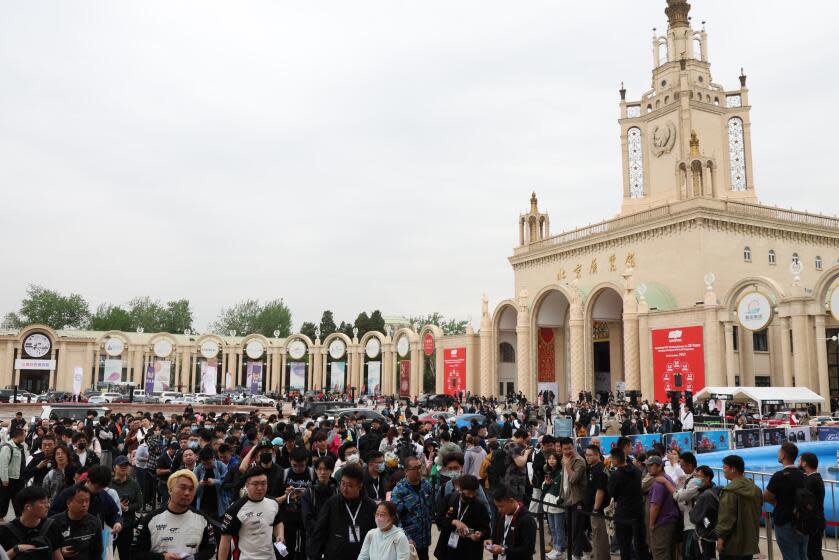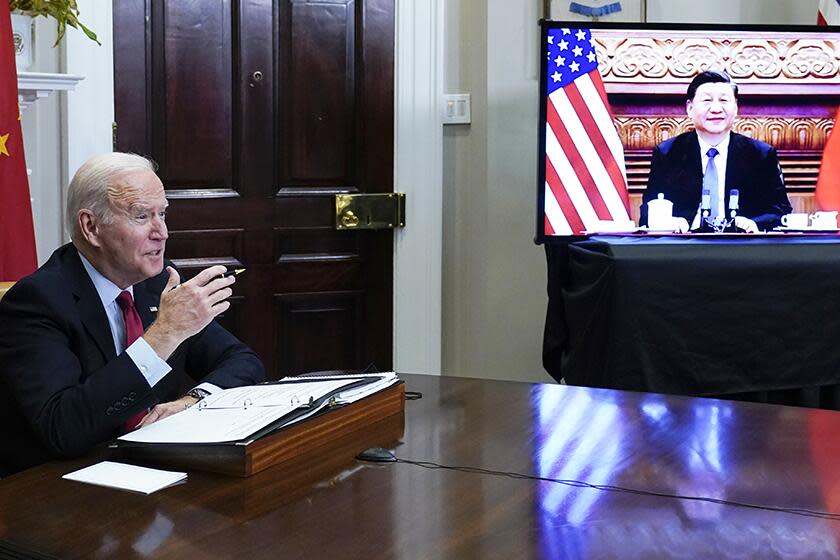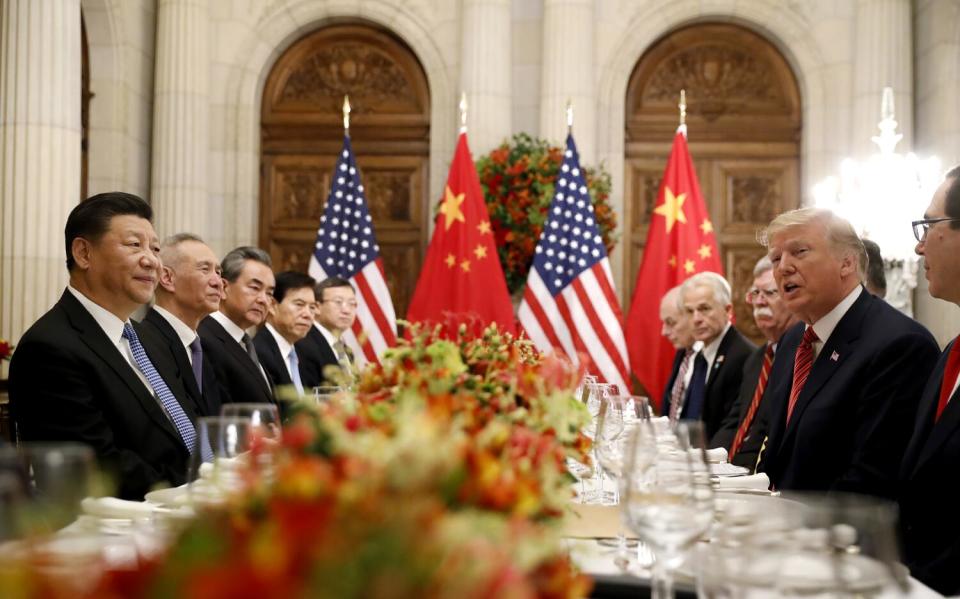Trump and Biden both say they're tough on China. But whom would Beijing prefer to deal with?

No matter who wins the U.S. election in November, for China it’s lose-lose.
With mistrust between the two nations deepening, both President Biden and presumptive Republican nominee Donald Trump have sought to cast themselves as hard-line negotiators who will stand tough against China’s rise.
And with both candidates vying to prove their mettle on dealing with China, experts are divided on which would ultimately harm Beijing’s interests more.
There’s no best-case scenario. There’s only the bad scenario and worse scenario
Yun Sun, China expert
“There’s no best-case scenario. There’s only the bad scenario and worse scenario,” said Yun Sun, director of the China Program at the Stimson Center, a Washington-based think tank.
Biden has proved himself to be the more predictable president, which appeals to China’s penchant for stability. But steadier leadership in Washington could bolster its partnerships in the Asia-Pacific, at a time when Beijing feels increasingly penned in by U.S. allies such as Japan, Australia and the Philippines.

As the more capricious politician, Trump might undermine such alliances, providing a vacuum for Beijing to step in and strengthen ties with U.S.-friendly nations. However, his impulsive tendencies could trigger a rapid deterioration of the relationship between China and the United States.
“With the Biden administration, the Chinese side is concerned with the long-term power play,” said Minghao Zhao, deputy director for the Center for American Studies at Fudan University in Shanghai. “If we have a Trump presidency, we have to be worried about more turbulence."
The Biden administration has made some efforts to improve frayed ties with China. In November, Biden and President Xi Jinping met in Silicon Valley and agreed to restart military-to-military communications, which China suspended in retaliation for then-Speaker Nancy Pelosi’s visit to Taiwan in 2022. Analysts said the pact was critical in preventing flare-ups from becoming broader conflicts.
“For two large countries like China and the United States, turning their back on each other is not an option,” Xi said.
Still, sticking points remain.
When Biden was asked if he trusted Xi, he invoked an old Russian adage popularized by President Reagan during the Cold War: "Trust but verify."
Read more: China’s highflying EV industry is going global. Why that has Tesla and other carmakers worried
The current administration’s focus on Chinese “overcapacity” in metals and electric cars signals more sparring over technology and trade and China's impact on U.S. industries.
Last week, Biden called for the tripling of tariffs on steel and aluminum imports from China to combat what he described as “unfair trade practices,” and a flood of cheap, low-quality products that have distorted the U.S. market.
The latest initiative builds upon the trade war that Trump launched in 2018, implementing 25% duties on billions of dollars of imports from China, such as cars, metals and machinery. In February, Trump threatened to raise tariffs on Chinese imports to 60% or more if he became president again.
U.S. officials also have become more wary of Chinese software and the security risks it poses for U.S. users. On Wednesday, Biden signed into law a measure that would either ban or force a sale of the Chinese-owned short video app TikTok.
Read more: Biden signs $95-billion military aid measure that includes path to ban TikTok
That same bill included about $8 billion in security assistance for Taiwan, which Beijing considers part of its territory. The sovereignty of the self-ruled island is a particularly contentious impasse in U.S.-China relations, as Washington has strengthened ties with Taiwanese officials and China has increased military aggression.
China said it opposed the aid allocated for Taiwan and has accused the U.S. of enabling the island democracy to pursue formal independence. Biden has said publicly that the U.S. would send military assistance to Taiwan if China attacked, but the administration has clarified that U.S. policy has not changed — that the United States acknowledges Beijing’s claim to the island but does not endorse it.
The U.S. has warned China against providing aid to Russia in its war with Ukraine, and has considered sanctioning Chinese banks to deter support, the Wall Street Journal reported Tuesday. U.S. Secretary of State Antony J. Blinken is expected to discuss Ukraine among other disputes during a visit to China this week, and issued a warning ahead of his arrival.
"If China purports on the one hand to want good relations with Europe and other countries, it can’t on the other hand be fueling what is the biggest threat to European security since the end of the Cold War," Blinken said Friday.
China said the U.S. was making "groundless accusations." It also objected in a formal complaint to the World Trade Organization to recent U.S. legislation offering subsidies to incentivize domestic manufacturing of electric vehicles.
During the last election, some analysts had predicted that Biden would be softer on China compared with Trump. This time, it’s clear that neither candidate is likely to reverse a decade-long hardening against China, said Ho-fung Hung, a professor of political economy at Johns Hopkins University.
That shift began with President Obama’s efforts to establish stronger economic and diplomatic ties in Asia, spurred by growing unease with Beijing’s military assertiveness, as well as complaints that Chinese competitors were unfairly squeezing out U.S. companies, Hung said.
Now, “the only difference between different presidents would be the details and approaches of how they implement the toughening policy,” he said.

Both candidates have a history of angering China with public remarks. After their November meeting, Biden again referred to Xi as a dictator. And while Trump has been quicker to praise Xi, he maligned China during the outbreak of COVID-19, which he insistently referred to as the "Chinese virus."
Minxin Pei, a professor of government at Claremont McKenna College, said that stronger anti-China rhetoric among Republicans may inevitably beget harsher China policies under Trump.
“They’re being so tough on China, it might be difficult for them to climb down,” he said.
But Ja Ian Chong, an associate professor of political science at the National University of Singapore, said that since Trump doesn’t adhere to political conventions, Beijing may see more opportunity to negotiate with the former real estate mogul.
“Since Biden is tough anyway, it may be worth the risk to roll the dice and see what Trump might bring,” Chong said.
Read more: Questions swirl over the future of TikTok. Who could own it? How will the platform operate?
Some reports on Chinese disinformation campaigns also indicate a potential preference for a Trump presidency.
An April report from the London-based Institute for Strategic Dialogue, a research organization, identified a network of Chinese government-linked social media accounts impersonating Trump supporters and propagating criticisms of Biden.
However, academics said attempts to spread information by Chinese actors are probably more geared toward sowing doubt in democracy and America rather than directly targeting Trump or Biden.
“I think they are more interested in showing that democratic elections are not an effective system,” Sun from the Stimson Center said. “In that sense, undermining credibility is more important for China than undermining a specific candidate.”
Commentators from Chinese state and social media have criticized both candidates as indicative of the flaws of democracy and America’s decline. An April commentary from China’s official state news agency said money, rather than voters, would ultimately decide the next U.S. president.
Sima Nan, a Chinese television pundit, said in a video on Chinese social media last year that a race between Biden and Trump would be a difficult choice — like picking between spoiled Coke or spoiled Pepsi.
Special correspondent Xin-yun Wu in Taipei contributed to this report.
This story originally appeared in Los Angeles Times.


